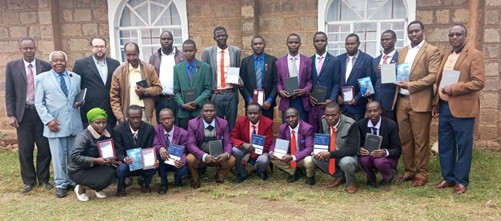WHAT IS TRUE FAITH?

In these last days, our faith will be put to the test. If we want to please God, we must be a people of faith—not just any faith, but true faith. “But without faith it is impossible to please him: for he that cometh to God must believe that he is, and that he is a rewarder of them that diligently seek him” (Heb 11:6).
So, what does it mean to have true faith? I believe we find a wonderful example in Job, who demonstrated true and great faith that pleases God. Job’s faith was put to the test, and Job showed great faith in God. His faith was authentic because it was (1) not a mercenary faith but an unconditional faith, (2) not a life-loving faith but a life-surrendering faith, and (3) not a man-pleasing faith but a God-pleasing faith.
Not a Mercenary Faith but
an Unconditional Faith
The first test had to do with Job’s possessions (Job 1:9–12).
Job was a very rich man—a tycoon by today’s standards. “This man was the greatest of all the men of the east” (Job 1:3b)—like Goh Cheng Liang, Singapore’s richest man.
Satan, the false accuser, mocked Job’s faith, claiming it was mercenary. Satan said to God, “Doth Job fear God for nought? Hast not thou made an hedge about him, and about his house, and about all that he hath on every side? thou hast blessed the work of his hands, and his substance is increased in the land. But put forth thine hand now, and touch all that he hath, and he will curse thee to thy face” (Job 1:9–11).
God allowed Satan to take away Job’s possessions, but he was not to harm Job physically (Job 1:12). In one day, Job lost everything—his cattle, servants, and children. What would you do if something like this happened to you?
Did Job pass the test? He passed with flying colours. Job said in 1:21, “Naked came I out of my mother’s womb, and naked shall I return thither: the Lord gave, and the Lord hath taken away; blessed be the name of the LORD.” Job did not believe in God because of money or worldly gain. He believed in God out of a pure and sincere heart. His faith was not a mercenary faith, but an unconditional one.
How about us? In times of economic hardship, job loss, or poverty, will we deny our Saviour? God is good and will protect and keep us even in difficult times. But if He chooses not to—will we walk away from Him?
I hope not. May we be like Peter, who said, “Lord, to whom shall we go? Thou hast the words of eternal life” (John 6:68). May we say from the heart: “Lord, what is money, luxury, comfort, pleasure, or wealth—without you?” “I’d rather have Jesus than silver or gold; I’d rather be His than have riches untold.”
Not a Life-loving Faith but
a Life-surrendering Faith
In Job 2, we find Job being tested again, now more severely. Here we learn another aspect of saving faith. True faith is not only unconditional, but also life-surrendering.
Satan did not give up. He again appeared before God and brought another accusation. In verse 4, Satan said: “Skin for skin, yea, all that a man hath will he give for his life.” In other words: “So what if Job lost his possessions? Anyone would willingly give up wealth and even children to save their own life.” In verse 5, he accused Job: “But put forth thine hand now, and touch his bone and his flesh, and he will curse thee to thy face.” That is, “As long as Job has health, he will worship you. But touch his body with disease, and he will curse you.”
The Lord then gave Satan permission to test Job again—he could afflict Job physically but not take his life (Job 2:6).
Satan struck Job with “sore boils” from head to toe (Job 2:7). The boils were so painful and itchy that Job had to scrape himself with broken pottery. This agony lasted several months (see Job 7:3; 29:2). He was cast out to sit among the ashes—likely the dung heap outside the city, where lepers and beggars scavenged.
In this misery, Job was taunted by his wife: “Dost thou still retain thine integrity? Curse God, and die” (Job 2:9). In effect, she was saying: “Why keep your faith? Just end it. Curse God and be done with it.”
But no one with true, saving faith would ever do such a thing. Even at the point of death, a born-again Christian will never renounce their faith—curse God and commit suicide.
What was Job’s response? He rebuked his wife as a foolish woman and said, “Shall we receive good at the hand of God, and shall we not receive evil?” (Job 2:10).
Job’s faith was again proven—not mercenary, not life-preserving, but life-surrendering. “I am nothing. God is everything.”
Not a Man-pleasing Faith but
a God-pleasing Faith
In the midst of his pain, Job was visited by his friends. Instead of offering comfort, they overwhelmed him with accusations—false claims, misrepresentations, even lies. Job rebuked them in chapter 13:4–5 and made another powerful confession of faith in verse 15: “Though he slay me, yet will I trust in him: but I will maintain mine own ways before him.”
Job was not trying to please men. He was not swayed by popularity. He lived with integrity before God. He would not compromise truth for the sake of friendship.
Wanting to be liked and popular is the weakness of many Christians today, especially leaders. That is why many churches have compromised. Mainline denominations have forgotten the Reformation. Why? Because they fear being called “fundamentalists,” “bigots,” “narrow-minded,” or “unloving.” Hence, they compromise to please everyone: I am OK, you are OK, everyone and everything is OK—when it is not! “We are one in the bond of love,” they say. But what kind of love is it? It is a love without truth. It is a love that is man-pleasing, not God-pleasing. God is not OK with a love that is outside of His truth. 1 Corinthians 13:6 says very clearly: love “rejoiceth not in iniquity, but rejoiceth in the truth” (1 Cor 13:6).
Now, we are told to speak the truth in love (Eph 4:15). It goes without saying that we should not be deliberately insensitive, offensive, rude, or caustic. Nevertheless, it is vital that we do not compromise the truth, doctrine, or principle. Give those up, and we are finished.
Make no mistake about it: when we seek to defend God’s Word and live according to His will without compromise, we will face attacks—from Satan, from unbelievers, and even from those who call themselves Christians. Sometimes, even our best friends can become our worst enemies.
But what must we do? Paul says in Galatians 1:10, “For do I now persuade men, or God? or do I seek to please men? for if I yet pleased men, I should not be the servant of Christ.”
Our duty is to be faithful to our Master and Saviour. Loyalty must be to Him alone. We must bear false accusations patiently, looking to the Lord and His Word for counsel and comfort all the time. That is why the Bible commends Job: “Behold, we count them happy which endure. Ye have heard of the patience of Job, and have seen the end of the Lord; that the Lord is very pitiful, and of tender mercy” (Jas 5:11).
We believe this by faith. Men may offer clever arguments and present so-called evidence, but ultimately, the Bible alone is our supreme and final authority. What God says settles everything.
Like Job, we must say: “I don’t care what people say. I only believe what my God and Saviour says.” What He says is the truth, and “we can do nothing against the truth, but for the truth” (2 Cor 13:8). JK
TR-BASED KALENJIN NT
Praise the Lord for the translation of the New Testament in Kalenjin, based on the Textus Receptus or Received Text of God’s inspired Word. The following is a report from the Rev Dr Michael Koech, received on 8 July 2025:
Dear Dr Khoo,
Greetings in Christ’s Name. We are well in Kenya and continuing to labour in the Lord’s ministry.
As you are aware, we have been working on a new Bible translation in the Kalenjin language for the past eight years. It is one of the many languages spoken in East Africa. We have now completed the New Testament in collaboration with the Trinitarian Bible Society (TBS), which has printed and delivered 7,000 copies to us.

We will be holding a thanksgiving service this Friday, 11 July 2025, in Eldoret, where Philip Lagat is the pastor, and another on Saturday, 12 July, at Bomet Bible Institute. A representative from TBS will attend both services as the main speaker. As we give thanks, we also pray for the completion of the Old Testament. We are currently doing the final proofreading, and we hope it will be ready by the end of 2026.
Please pray that, as this translation goes out, readers will become aware of the shortcomings of existing translations and recognise the importance of preserving the doctrine of Bible Preservation. This new translation is accompanied by two booklets that highlight the deficiencies of current versions.
We are always grateful for the lessons we learned at Far Eastern Bible College. Jonathan Langat is our coordinator, and Daniel Yaban is one of the translators.
Continue to pray for us.
In Christ,
Michael Koech
[Ed: More information on the Kalenjin NT can be found on the TBS website (tbsbibles.org). See under The Kalenjin New Testament – Trinitarian Bible Society.]

Kalenjin Bible Translators and General Secretary of the Trinitarian Bible Society
with Students of Bomet Bible Institute


